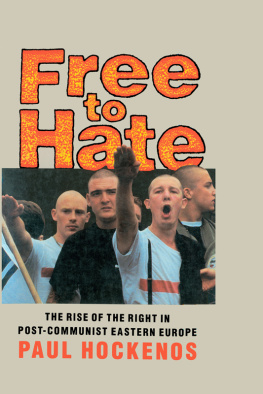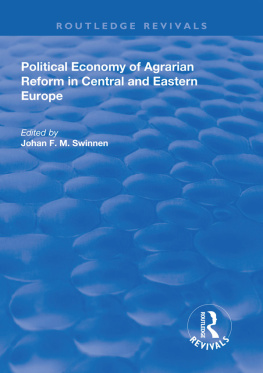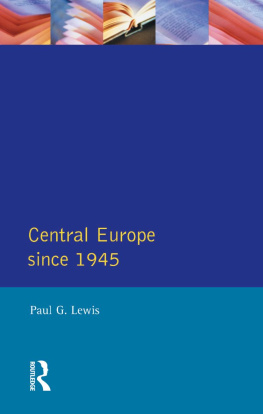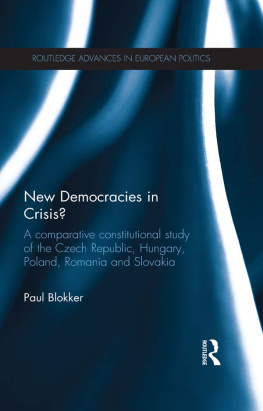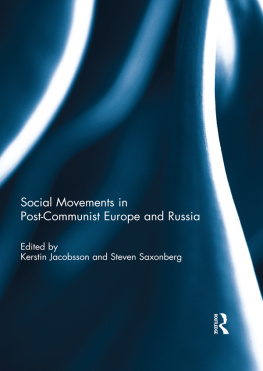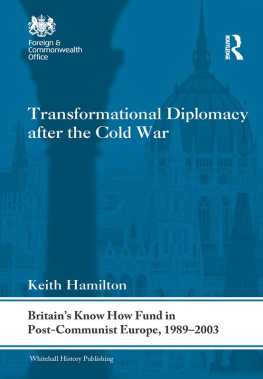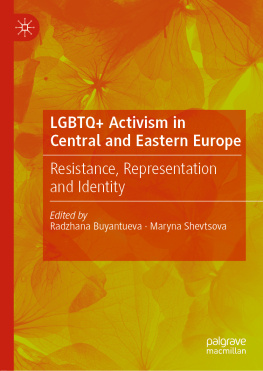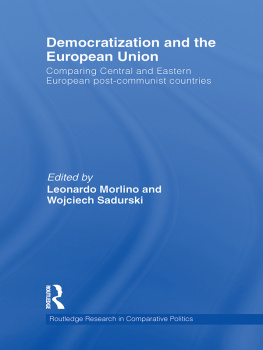THE RISE OF THE RIGHT IN
POST-COMMUNIST EASTERN EUROPE
PAUL HOCKENOS
Published in 1993
Paperback Published in 1994 by
Routledge
Taylor and Francis Group
270 Madison Avenue
New York, NY 10016
Published in Great Britain by
Routledge
Taylor and Francis Group
2 Park Square
Milton Park, Abingdon
Oxon OX14 4RN
Copyright 1993 by Routledge
All rights reserved. No part of this book may be reprinted or reproduced or utilized in any form or by any electronic, mechanical or other means, now known or hereafter invented, including photocopying and recording, or in any information storage or retrieval system, without permission in writing from the publisher.
Library of Congress Cataloging-in-Publication Data
Hockenos, Paul, 1963
Free to hate : the rise of the right in post-communist Eastern
Europe / by Paul Hockenos.
p. cm.
Includes bibliographical references and index.
ISBN 0-415-90824-8 (cl.) 0-415-91058-7
1. FascismEurope, Eastern. 2. NationalismEurope, Eastern.
3. Post-communismEurope, Eastern. 4. Europe, EasternPolitics
and government1989 I. Title.
JC481.H56 1993
320.530947-dc20931847
CIP
British Library cataloging information also available.
To the others, who are many
CONTENTS
U nfortunately, it is impossible for me to thank all of the people who in some way contributed to the writing of this book, from the support of my friends to complete strangers who provided me with a bed for the night. The kindness and sincerity of a great many of the people whom I met during my travels in Eastern Europe contradict the impressions and simplistic conclusions that could easily be drawn from this book.
Nevertheless, I do here thank the people who contributed most directly to the final product. Among them I am grateful to Bob Cohen, Lzr Ildik, Marc Woodworth, Carol Fiedler, Bnszegi Lci, Mary Ellen Fischer, Helga Doblin, Stephanie Baker, Daniel Balmuth, Bernd Siegler, Erich Rathfelder, Gloria Channon, and Max Zutty. I would also like to thank all of the superb journalists at Die Tageszeitung, and in particular Randy Kaufman for his generosity in opening its archives to me, as well as Sheryl Larson, James Weinstein and Beth Schulman at In These Times. I am also grateful to my many friends and colleagues at the Helsinki Citizens Assembly. I mention also Wade Green for arranging some financial support for the project.
Special thanks goes to William Totok for his invaluable assistance on the Romania chapter. Also, I am deeply indebted to Jasper Tilbury for his insightful comments on the text and collaboration on the Poland chapter; that chapter is as much his as it is mine.
If I had to single out only one person to thank, it would have to be Adam Blauhut, whose open criticisms, comments, and encouragement find their echo throughout the book.
Last but definitely not least, I thank my parents, without whom this book would never have happened.
That things continue on this way is the catastrophe.
Walter Benjamin
I f I had to trace the germ of this book to a specific time or event, it would be a visit to the Malibu Jugendklub in East Berlin on Christmas Eve 1989, a month and a half after the opening of the Berlin Wall. I had spent the day in West Berlin between my laptop and the kitchen radio, listening to the latest broadcasts from Romania about the revolution there. Despite the initial, exaggerated reports of tens of thousands of massacred protestors, I was thrilled to hear that the Dictator, as Romanians referred to President Nicolae Ceauescu, had been overthrown. There would be plenty of rejoicing this Christmas in Romania, and the euphoria was palpable everywhere that the walls and their architects had fallen.
The excitement over the changes in the German Democratic Republic (GDR) had naturally infected West Berlin, where the cafs and bars were crowded, the mood inside light and cheerful. But I had begun researching a story on Skinheads in East Germany, and that Friday evening I had plans to visit a certain disco in the outlying East Berlin district of Hellersdorf. The youth club was a well-known hang-out for young neo-Nazis and fascist Skinheads. It was rumored that a Mozambican guest worker had been murdered there two years ago, although neither the East nor West German press had made mention of the killing.
Nearly an hours trip away on the S-Bahn, the commuter railroad, the Malibu lay at the base of a labyrinth of tall, cement-gray high rises, the kind of Stalinist housing projects that dominate East Berlin beyond its refurbished tourist center. Inside the disco, a sparse, box-like room that served as a cafeteria by day, a strobe light flashed wearily to some 1970s pop hits. A rotund man in his mid-thirties, perhaps a communist youth functionary a month ago, presided over the turntables as a handful of teenage girls danced with one another. There were no Skinheads to be seen, but outside on the terrace, a group of young guys in collarless baseball jackets, with short haircuts and thin moustaches, stood about smoking cigarettes. Some sat on the dirty steps, while others paced anxiously back and forth, disappearing inside for a few minutes and then reappearing. The boys shared a similar nervousness in their movements and blank, cruel gazes. They had about them an aura of adolescent meanness, anger, and restlessness.
The boys recognized me at once as a stranger. Though wary, they seemed curious enough about my presence in Hellersdorf on Christmas Eve to agree to chat. No, they said, they hadnt been following the events in Romania. Yes, they agreed, the opening of the Berlin Wall was a fine thing, even if it was only the first step to ousting the communists once and for all. As for politics, they didnt have much use for them, and none of them identified with any of the political parties, East or West. At the same time, they all considered themselves right wing, which translated first into being anti-communist and second into wanting the reunification of Germany. Finally, they said, they could be proud to be Germans again.
They knew the Skinheads who frequented the Malibu, who would usually show up later in the evening and start fights or shout Sieg Heil!, Foreigners Out!, and other such slogans. The adolescents in the baseball jackets werent fascists, but they didnt have anything against the Skinheads either. On some things, like the niggers and the Fidschis (Asians), the Skins say it like it is, said one of the guys, a pimple-faced teenager a bit more talkative than the others. They come here from the third world and get everything that they want, just because theyre communists. But now thats come to an end. When I asked, they said that they knew about the murdered Mozambican. The worker, one said, had been harassing all of the local girls.
I naturally had no idea at the time that in a few years the aggression against foreigners in eastern Germany, as well as in the western states, would climax in a string of vicious pogroms, arson attacks, and dozens of deaths, events that would shake the very foundations of the newly united Germany. There had been a small underground neo-fascist movement in the GDR since the early 1980s, and racism against people of color was nothing new in any of the communist countries. These guys from the Hellersdorf projects werent committed Nazis, however, but more or less average teenagers, born and raised in the GDR. They clearly had little in common with the dissidents and intellectuals who were basking in the world spotlight at the moment, touting ideas of civic democracy and human dignity. They were frustrated and bored, looking at a future that had even less to offer than they imagined at the time. Like their peers throughout Eastern Europe, they had pinned their hopes for a new future on a swift transition to capitalism, which, they were convinced, would put their living standards on a par with that of the West Germans in just a few years time. But how would they react if these expectations failed to materialize? If they found themselves unemployed upon finishing vocational school instead of pulling in comfortable West German salaries?

